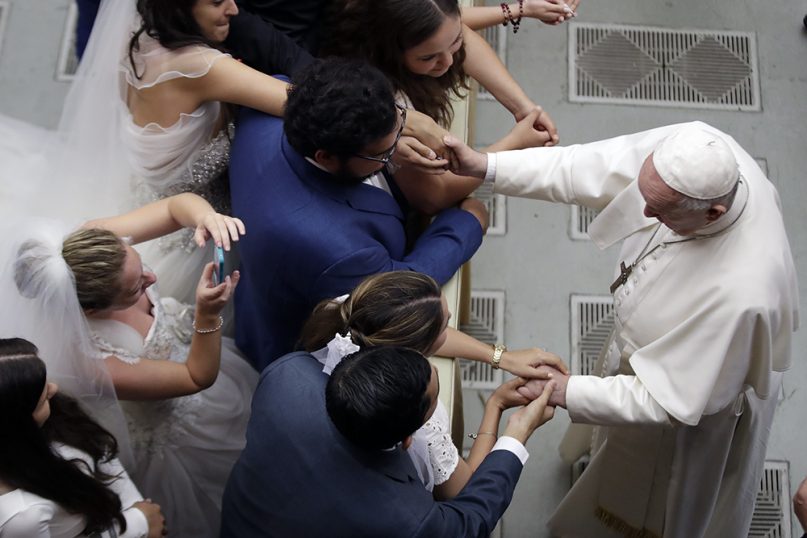VATICAN CITY (RNS) — A recently resurfaced book by the Vatican’s doctrine czar, Cardinal Víctor Manuel Fernández, caused a stir in the Catholic world when it described orgasms as a “sublime act of worship of God.” But the book, titled “Mystical Passion: Spirituality and Sensuality” and written in the 1990s, is hardly the first time a Catholic leader — or even a pope — has spoken candidly about sex.
For Pope Pius XII, there was nothing wrong in married couples seeking pleasure during sex, and Pope John Paul II described marital intercourse as the representation of God as love in his 1960 book “Love and Responsibility.” And it was under his pontificate that Fernández, now the Prefect of the Dicastery for the Doctrine of the Faith, wrote those now infamous lines elevating the orgasm to a kind of divine adoration.
In his decade as pope, Francis has tried to usher in a more positive, frank approach to the topic of sex in the Catholic Church, urging the institution to reckon with the real-life experiences of faithful today and addressing topics ranging from pornography, abstinence and dating apps to orgasms.
Starting with his 2016 apostolic exhortation “Amoris Laetitia,” or the “Joy of Love,” Francis underlined the importance of sex in marriage. He criticized the church for taking an often abstract and theological approach to sexuality, opting for a more realistic and pastoral acknowledgment of human sexuality. In the document, the pope spoke of sex as not something to be frowned upon or shunned, but as a fundamental aspect of married life, which must be catered to and reflected upon.
With Valentine’s Day and Ash Wednesday falling on the same day this year — a peculiar collision of passion and penance — it’s worth looking again at the church’s teaching on love and intimacy and the ways Francis has recast those conversations. Here are five of the more emblematic moments when Francis has addressed sex.
-
Sex and food are ‘divine’
In an interview book published in 2020 with the founder of a slow-food movement in Italy, Carlo Petrini, Pope Francis criticized Catholic doctrines that emphasized rigidity and a “bigoted mentality” regarding sex. He said that because food and sex are necessary for human survival, God has made them “beautiful and rich with pleasure.”
“The church has condemned inhuman, crude, vulgar pleasure but it has always accepted a pleasure that is human, sober and moral. Pleasure derives directly from God, it isn’t Catholic or Christian or other, it’s simply divine,” he said.
“The pleasure of eating is necessary so that when we eat we stay healthy, and in the same way sexual pleasure is there to make love more beautiful and to guarantee the continuation of the species,” he added.
-
There are worse sins than having sex outside of marriage
During his return flight from an apostolic visit to Greece in 2021, Pope Francis told journalists that “sins of the flesh are not the most serious” when addressing rumors of indiscretion by French Archbishop Michel Aupetit.
“The gravest sins are those that are more angelic: pride, hatred. These are graver,” he added, stating that everyone is a sinner, including the apostle St. Peter.
-
Porn is a vice that tempts priests and nuns too
Social media and the internet can be powerful tools for lay faithful and clergy to engage with the world and share their faith, but they also hide dangers and perversions, the pope said. During a convention with seminarians in Rome in October 2022, Francis warned specifically about the dangers of pornography.
“It is a vice that so many people have. So many laymen, so many laywomen, and also priests and nuns. The devil enters from there. And I’m not just talking about digital pornography like that of child abuse, this is already degeneracy. Dear brothers, pay attention to this,” he said.
-
When it comes to sex, the church is ‘still in diapers’
In a documentary released in April titled “The Pope: Answers,” Francis answered the questions of 10 young adults on a wide range of topics, including online dating and masturbation. The pope said using dating apps such as Tinder is a “normal” way for people to get to know one another and he once again described sex as “one of the beautiful things God gave to human beings.”
A young woman who creates online adult content asked the pope about her profession and his views on pornography and masturbation. “To express oneself sexually is something rich,” Francis answered, “anything that diminishes a true sexual expression diminishes you as well, it renders you incomplete, and it diminishes that richness. Sex has a dynamic of its own. It exists for a reason. It’s an expression of love.”
The pope also stated that the Catholic Church “is still at a very early stage” when it comes to its teaching on sexuality, adding that its “catechesis on sex is still in diapers.”
-
Pope Francis said it too: Orgasms are a gift from God
While some Catholics have been scandalized by Fernandez’s out-of-print book on sexuality, Pope Francis seemingly echoed his doctrine chief during his weekly audiences in St. Peter’s Square in January when he described sexual pleasure as “a gift from God.”
“Love is beautiful,” the pope said, but it must not be confused with “the demon of lust,” which “destroys relationships.” The pope said the world shows ample examples of such destruction. “How many relationships that began in the best of ways turned into toxic relationships, of wanting to own the other, devoid of respect and boundaries?” the pope asked.
Francis pointed to the sensuous passages contained in the Bible, such as the Song of Songs, to underline that “there is no condemnation of sexual instinct in Christianity.”





